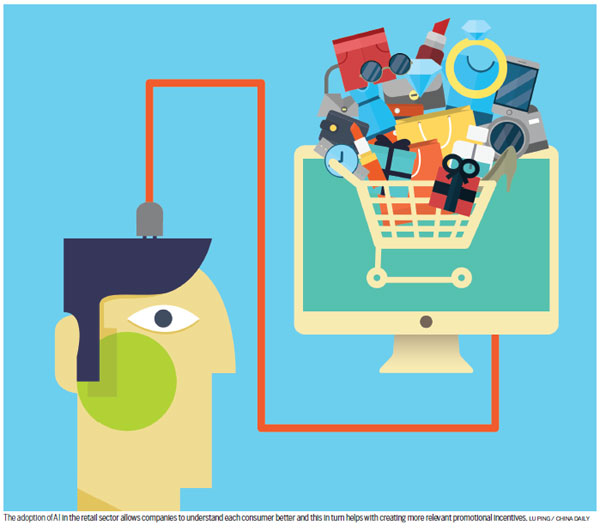Knowing you better than you know yourself

 Experts say that the adoption of AI in China's retail sector is only going to become more prevalent, and consumers can look forward to a shopping experience that is highly customized to their needs and habits
Experts say that the adoption of AI in China's retail sector is only going to become more prevalent, and consumers can look forward to a shopping experience that is highly customized to their needs and habits
The term "artificial intelligence" is often associated with driverless cars and highly sophisticated machines that can outsmart even the best of human minds in complicated tasks like the strategy board game Go.
But the application of artificial intelligence (AI) goes far beyond these attention-grabbing examples. In China, for example, AI is playing a less visible albeit vital role in changing online shopping experiences by using algorithms to track, analyze and satisfy each consumer's specific needs.
Online shoppers these days can often find similar alternatives appearing on their screens after searching for a particular product. Virtual shop fronts could also display different products according to each customer's buying habits and preferences. All these are made possible with the application of AI.
"Simply put, AI technology takes a big data set about something, runs it through algorithms such as neural networks and then produces a model which can provide answers like a real human," said Wang Xin, a Shanghai-based partner covering the technology industry at global consultancy Roland Berger.
"The computer then learns to recognize patterns in the data and builds up a base of experiences that can be applied to solve problems in new situations," he added.
RJ Pittman, senior vice-president and chief product officer at eBay, likened AI to an experienced salesperson at a physical store. He also expects the application of such technology to become prevalent in online retail.
In a new report released in November, Roland Berger placed retail on par with finance, medicine and automobile as the industries in China that are most likely to benefit from the adoption of AI. The technology is also expected to help retailers in the country trim 420 billion yuan ($63.5 billion) in operating costs by 2030.
Within retail, e-commerce is the segment that is poised to reap the most benefits. After all, it is a data-rich industry that is well-stocked with information about consumers' browsing histories, purchasing preferences and credit records.
The application of AI in e-commerce is especially important in China because of how Chinese consumers shop, according to a report released in June by Boston Consulting Group.
Research has shown that unlike their Western counterparts who have a more straightforward search-and-buy approach, Chinese consumers have a penchant for exploring during the shopping process.
"Chinese consumers embark on a journey of exploration and discoverythey go online to see what's new or trending, and they interact with fellow buyerssometimes many times a day," according to Chris Biggs, a partner at BCG who leads the digital retail business.
As such, retailers rely on AI to analyze browsing behavior in order to determine the best customized promotions or content to display on each consumer's device.
China's tech giants have wasted little time in placing their chips on AI. According to consultancy Oliver Wyman, Chinese tech companies poured nearly 40 billion yuan into the research and development of this technology last year. E-commerce giants have in turn sought to partner these tech companies and leverage their expertise in AI.
For example, merchants on China's second-largest e-commerce site JD are able to customize their storefront offerings based on each customer's shopping history and preferences, thanks to the site's partnership with Chinese tech company Tencent, the operator of WeChat.
Tencent Chief Operating Officer Ren Yuxin said the company can also offer merchants customized content marketing opportunities via WeChat Moments, which is similar to status updates on Facebook.
"Because if you offer customers exactly what they need at a better price, you start building a personal selling relationship with your customers, therefore boosting sales and deepening customer loyalty," said Ren.
Koubei, a local service platform that provides consumers with discount coupons, offered their merchants similar services that have helped boost their average sales by 20 percent during a three-month trial period that ended in November.
According to the project leader Liang Yong, Koubei enabled merchants to provide consumers with customized deals based on their purchasing preferences and average in-store spending. For example, the system would halve the price of a dish that a customer frequently orders as a form of incentive.
"By providing the most relevant discounts, it helps to draw more recurring customers and boost sales," Liang said.
Over at Alibaba, the world's largest online shopping platform by transaction volume, an "E-commerce Brain" system helps pinpoint people's needs and deliver relevant recommendations.
This is exemplified in the case of Chang Man, the mother of a six-month-old child.
After purchasing diapers on Taobao, one of Alibaba's e-commerce sites, Chang received promotional materials regarding maternity and child-care from Weitao, a micro-blogging service for brands, as well as Taobao Headlines, a sister service. She ended up buying more than just diapers that day.
"All those other items weren't on my shopping list but I found them to be quite relevant. The shopping app is like a mind-reader. It knows me better than I know myself," said Chang.
Alibaba also has an AI-powered virtual assistant called Ali Xiaomi, or Ali Assistant, to handle up to 95 percent of inquiries, said Zhao Binqiang, an algorithm expert at Alibaba who now leads the firm's digital marketing unit.
Zhao said that users can even request for the chatbot to help with their shopping needs. After receiving a text, voice description or image of a user's desired product, Ali Xiaomi can generate a list of options that can be filtered by brand, color and other characteristics.
"In the world of shopping, a picture is worth a thousand words. This is especially so in fashion because it's really hard to describe what you see or desire," said Pittman.
Such image recognition technology can be found in brick-and-mortar stores as well. At Danish apparel brand Vero Moda, the Magic Mirrors system allows customers to view themselves in the clothes they pick. It can also swap those clothes with other recommendations, removing the need to constantly shuttle between clothing racks and changing rooms.
"If you pick a pair of jeans, the machine will present five alternatives in 10 different colors. It can also recommend the most suitable tops, bags and other accessories to match your selection," said Liu Jian, the store chief at Vero Moda's outlet in Joy City, a mall in Shanghai.
Business owners and industry experts have said that it would take at least 10 more years before the impact of AI in retail can be considered truly phenomenal.
"AI can currently identify factors such as brand, size and color, but it is still unable to determine the difference between styles and read the very subtle meanings that are hidden between the lines," said Pittman.
"AI is influencing and changing the physical manifestation of retail stores. In the future, it's going to be a hybrid of physical showroom to get people inspired, and a large, virtual warehouse where the entire inventory is stored," he added.
hewei@chinadaily.com.cn
- J-35, J-15T and KJ-600 have been launched from CNS Fujian supercarrier using an electromagnetic catapult, Navy says
- Telling Xinjiang's story through new media
- Qingdao brews romance: Foreign couple experience fine beer, film tech and wellness
- China will soon hold global summit of women in Beijing on occasion of 30th anniversary of 1995 World Conference on Women: spokesperson
- Irish writer Colm Toibin meets Chinese readers
- One dead in Shanxi chemical plant explosion





































